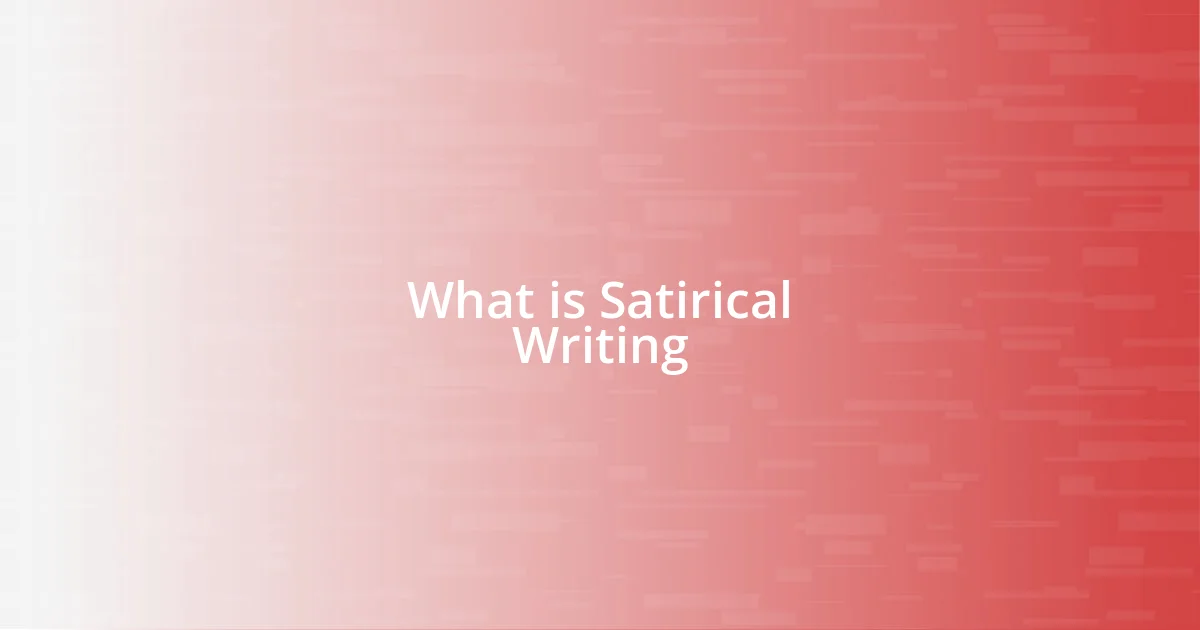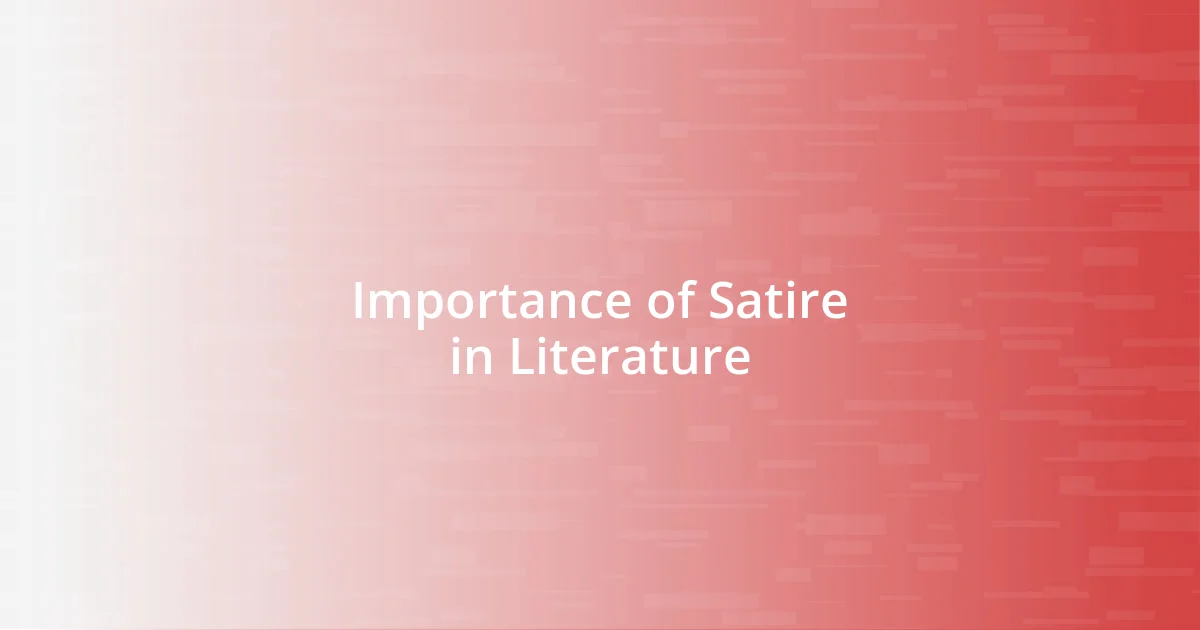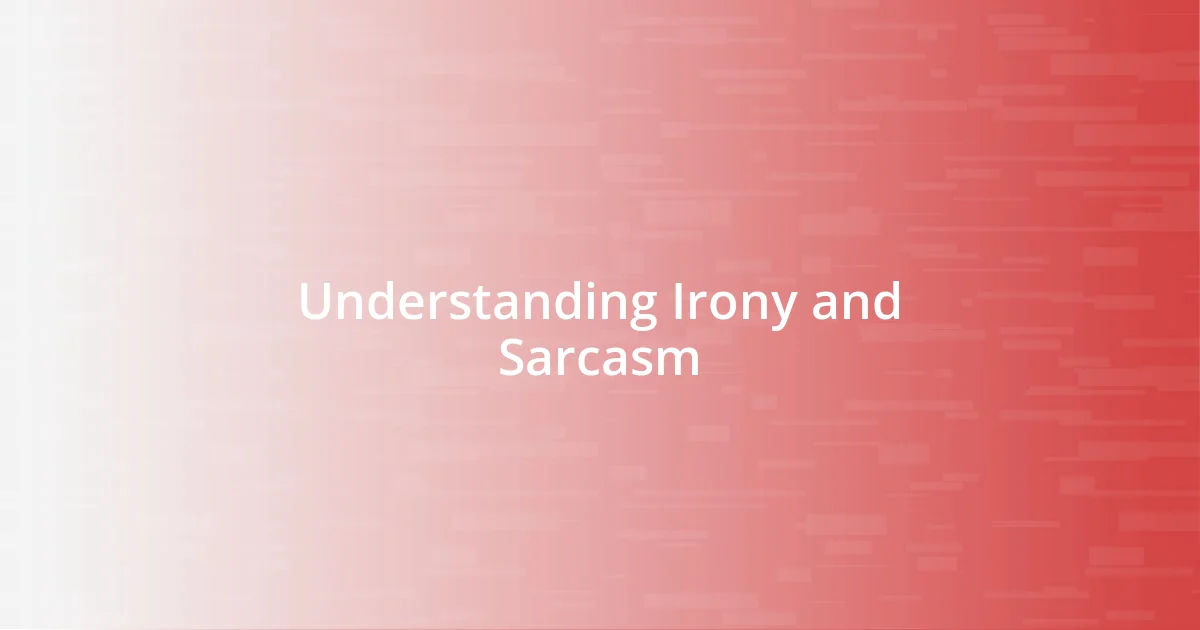Key takeaways:
- Satirical writing blends humor and critique, using exaggeration and irony to provoke thought and encourage readers to question societal norms.
- It serves as a powerful tool for engagement, fostering solidarity among readers and igniting discussions about complex social issues.
- Developing a unique satirical voice involves embracing authenticity, experimenting with different styles, and incorporating personal experiences to resonate with audiences.

What is Satirical Writing
Satirical writing is a clever blend of humor and critique, designed to highlight the absurdities of society and human behavior. I often find myself laughing while simultaneously reflecting on a deeper truth, wondering how writers like Jon Stewart craft their narratives to slip important messages into the laughter. It’s a delicate balance that takes skill and insight.
At its core, satirical writing uses exaggeration, irony, and sometimes even sarcasm to provoke thought and discussion. I remember reading a piece that poked fun at political figures, and while I chuckled, I was also struck by how effectively it revealed their flaws. It’s intriguing how laughter can serve as a gateway to understanding complex issues.
What truly fascinates me is how satire invites readers to question their own beliefs and the world around them. Have you ever found yourself re-evaluating a viewpoint after reading something witty yet profound? I certainly have. It feels like an invitation to engage critically with serious matters while enjoying the playful dance of language.

Importance of Satire in Literature
Satire plays a pivotal role in literature by enabling writers to challenge societal norms and provoke change through humor. I recall a time when I read “A Modest Proposal” by Jonathan Swift, where he suggested a ridiculous solution to poverty. The satire was so incisive that it forced me to confront my own complacency regarding social issues. It’s amazing how such sharp wit can ignite conversations about serious topics.
Another important aspect of satire is its power to unify readers through shared laughter and critique. I remember discussing a satirical piece with friends, each of us laughing and recognizing our own experiences reflected in the absurdity of the narrative. It creates a kind of solidarity, as if we’re all in on the joke together. This shared moment of realization often leads to deeper discussions about the subjects tackled in the satire, making it a powerful tool for engagement.
Satire also encourages critical thinking by stripping away pretenses, making complex subjects more digestible. I often find that when reading a satirical piece, the humor softens the blow of the criticism, allowing me to explore topics I might shy away from in a more straightforward narrative. It’s a fascinating dance—balancing humor with serious commentary—where every laugh may lead to a new understanding.
| Aspect | Explanation |
|---|---|
| Provokes Change | Challenges societal norms through humor. |
| Unifies Readers | Creates shared experiences and dialogues. |
| Encourages Critical Thinking | Makes complex issues more approachable. |

Understanding Irony and Sarcasm
Understanding irony and sarcasm is essential when diving into satirical writing. I vividly remember a moment in a comedy show where a comedian, in a mock-serious tone, praised the absurdities of everyday life—like waiting for a bus that never comes. The humor lay in its exaggeration, making the situation relatable yet highlighting the ridiculousness of our patience. It’s this contrast between what is said and what is meant that illustrates the beauty of irony and its ability to convey deeper truths.
-
Irony: This involves a situation that is contrary to what one would expect. For instance, when I witnessed a “no talking” sign at a lively café, I couldn’t help but chuckle at the clear contradiction and the laughter that followed.
-
Sarcasm: Unlike irony, it’s often a pointed remark, usually meant to mock or convey contempt. I recall a friend’s quip at a boring meeting, “Ah, yes, just what I needed for my entertainment!” It stung a bit, but we all laughed, uniting us in shared frustration.
-
Context Matters: Understanding the context of the statement is crucial. I once misinterpreted a sarcastic comment in an email, leading to an awkward response. It taught me to pay closer attention to tone and intention.

Lessons from Famous Satirical Works
There’s a lesson to be drawn from George Orwell’s “Animal Farm.” The allegory plays out in a way that made me reflect on how power can corrupt even the noblest of intentions. I remember feeling a sense of dread as I realized that the pigs, who started with idealism, gradually became indistinguishable from the tyrants they had overthrown. Isn’t it a chilling reminder that we must remain vigilant against the seductive nature of power?
In “The Onion,” I often find satirical headlines that seem outrageous at first but reveal a deeper truth about current events. I distinctly recall reading a piece about a government official “working harder than ever” to avoid doing any real work amid a crisis. This clever juxtaposition made me chuckle and think critically about those in power, reminding me to be skeptical of the narratives presented to us. Isn’t it interesting how humor can disarm our defenses while simultaneously making us question the status quo?
Jonathan Swift’s “A Modest Proposal” sticks with me because of its shocking premise—a satirical suggestion to alleviate poverty through cannibalism. The absurdity initially struck me as grotesque, but it left a lasting impression about the apathy often shown toward marginalized communities. I found myself grappling with my own feelings of helplessness in the face of deep social issues. Isn’t it fascinating how satire can hold a mirror to our own complacency, urging us to take action rather than remain passive spectators?

Applying Satirical Techniques in Writing
To effectively apply satirical techniques in writing, it’s crucial to embrace exaggeration. This approach can magnify the absurdities of a situation, creating a humorous yet thought-provoking commentary. I remember crafting a fictional advertisement for a “Hypothetical Busybody” app that tracked my friends’ every move. The exaggeration highlighted how intrusive technology can feel, prompting my readers to reflect on their own reliance on gadgets. Isn’t it interesting how pushing boundaries can spark both laughter and critical thinking?
Moreover, juxtaposition serves as a powerful tool in satire. By placing contrasting elements side by side, you can amplify the inherent absurdity of a topic. I once wrote a piece contrasting lavish celebrity lifestyles with the struggles of everyday citizens, painting a vivid picture of disparity. It was striking to see how this technique evoked emotions in readers—some were amused, while others felt a sense of injustice. Doesn’t this make us ponder the society we live in?
Irony also plays a pivotal role in satirical writing, allowing for a rich layer of meaning. I recall a time when I wrote a satirical article about politicians promising to “fix” the traffic in my city, illustrating how they continually fail to address core issues. The irony of their idealistic promises versus the reality of daily gridlock resonated with my audience and ignited conversations. It left me thinking about how such contrasts can unveil hidden truths. Could it be that a well-placed irony has the power to evoke a deeper understanding of societal flaws?

Developing Your Unique Satirical Voice
Finding your unique satirical voice is an exciting journey. I remember when I struggled to let my personality shine through my writing. At one point, I started infusing my daily experiences into my satire, like the time I attempted to cook a fancy meal and ended up ordering pizza instead. That little moment of honesty not only made me laugh but also resonated with my readers who could relate to the chaos of everyday life.
As I developed my voice, I learned the importance of authenticity. I began to embrace my quirks, weaving them into my satirical pieces. For instance, I once wrote a tongue-in-cheek article about my obsession with trying every new food trend that hit social media. The absurdity of my culinary adventures sparked lively conversations among friends and readers alike. It felt liberating to know that my genuine experiences could be a powerful vehicle for humor.
Another key factor in nurturing my satirical voice has been experimentation. I’ve tried various styles, from sharp one-liners to longer, narrative-driven pieces. I vividly recall the moment when I combined poetry with satire, crafting a piece that humorously lamented the absence of good coffee at a local café. That blend opened up a new creative avenue for me, making me realize that I could push boundaries. Have you ever experimented with different styles in your writing? It’s worth exploring!















